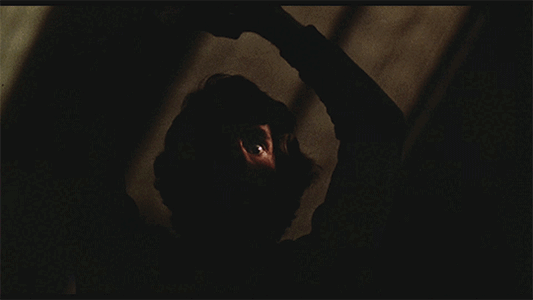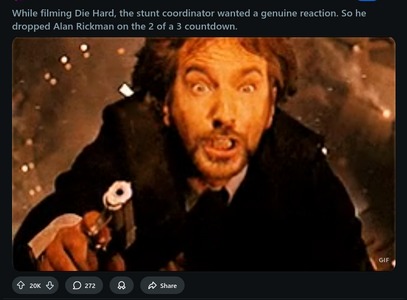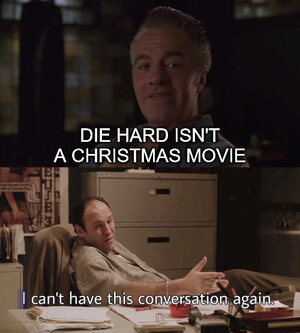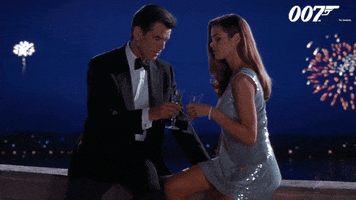Black Christmas (1974)
I can't believe I haven't written about Bob Clark's incredible holiday horror film,
Black Christmas, considering it's simultaneously one of my favourite horror and Christmas films. The movie basically launched the American slasher genre. John Carpenter's
Halloween took the holiday setting, the empty house, the unseen killer, and a bunch of POV shots and creepy phone calls directly from it.
Black Christmas is also one of the most unsettling horror films ever made, thanks to its amazing sense of dread and its refusal to give anything away about the killer. With real actors (OMG!) and some of the most memorable scenes ever put on film, this is top-notch horror that's a much-watch for me every season. I won't spoiler-tag this review because the movie is like 50 years old...
Olivia Hussey, riding high from her global fame in Franco Zeffirelli's
Romeo and Juliet, plays Jessica Bradford. Jessica's a stressed-out sorority sister dealing with a rocky relationship with her volatile pianist boyfriend, Peter (Kier Dullea). It's the holiday season, a time when emotions run high, especially in a rowdy sorority house like this one. Barb (Margot Kidder, before
Superman) is a fiery sister who enjoys her booze (can't say I blame her). Phyllis (Andrea Martin) is the sensitive enabler, and then there's Clare (Lynne Griffin), who... well, she's dead, trapped in the attic with a plastic bag over her head. And, like a persistent guest who won't leave the party, she remains there for the remainder of the movie(!).
The house also has a cat named Claude. He belongs to Mrs. Mac (Marian Waldman), the boozy landlady and former vaudeville performer. Even a minor character like Mrs. Mac has a backstory, unlike the remake where the characters feel like they barely exist. Too busy searching for her hidden liquor and keeping Clare’s worried father occupied, Mrs. Mac doesn't realize there's a killer in the attic. She meets her end early on, a gruesome but bloodless scene involving a hook to the face that pulls her up to join Clare.
Meanwhile, we learn why Jessica is so uptight: she’s pregnant and wants an abortion. The twist is that the heroine wants to terminate the pregnancy, while her moody artist boyfriend wants to keep the baby – something rare in later slasher films that linked sexual purity with their Final Girls. Jessica isn't a virgin, and she's not embracing traditional values. I wish there were more complex, interesting female characters like her. Peter starts acting oddly after a disastrous recital, smashing the piano in a rock star-esque way and drawing way too much attention to himself. And didn't those freaky phone calls mention a baby?? Hmmm...
Oh man, did I forget to mention the phone calls? Seriously, the most terrifying part of
Black Christmas is the series of bone-chilling calls the girls get. Whoever's on the other end is either a phenomenal voice actor or completely off their rocker. The mix of squealing, yelling, baby sounds, women's voices, grunting, crying, and incredibly vulgar language – think lots of talk about "piggy *****" – is just shocking. Seriously, if these sequences don't give you nightmares I don't know what will...
With the police involved, these smart college girls feel they've really accomplished something, especially since they've got the rugged Lieutenant Fuller (played by the equally rugged John Saxon) on their case. With only three girls left, Saxon stations a man in a car outside and has Jessica try to keep the caller on the line to trace the calls. It sounds dull on paper, but it makes for a wonderfully suspenseful series of scenes. We see the man at the phone company, desperately searching through rows of clicking machinery to find the call's origin. It's a risky idea, but it's beautifully executed.
Speaking of executed, Barb gets it next in another impeccably-conceived sequence. Jessica, listening to a group of Christmas Carolers, is intercut with Barb being killed with a crystal unicorn. The weapon choice is inspired, as is the way the murder is shot (notice the random skull in the background? Awesome detail!). The cross-cutting of the carolers with the stabbing is wonderfully macabre. They just don't do it like this anymore. Seriously, what's with that? The use of editing for dramatic effect in horror films these days is limited to frantic, pointless cutting or the overused "cut from a stabbing to a knife slicing into something” cliché...
So, Phyllis gets it off-screen, which is truly unsettling. Jessica then gets the message: the killer is, wait for it... in the house. Being a good friend, she tries to get Phyllis and Barb out, only to find their bodies in a bedroom. This leads to one of the most terrifying moments in horror history, hands down. The shot of Billy's eye peering through the door crack is pure genius, and it still manages to make me jump...
The ending, where the increasingly unhinged Peter snaps and is shot by his own pregnant girlfriend, is a cruel twist of irony. The police leave, a guard is posted to watch Jessica, and soon someone creeps down from the attic to claim their final victim. It's so wrong it's chilling – I have friends who won't watch it again because it's too upsetting. The killer is never caught (an innocent person is killed and wrongly labeled a multiple murderer), a pregnant woman (presumably) dies alone, and we never learn why any of this madness occurred. It’s a nasty film, and that's why it still terrifies people. Nearly bloodless, mercilessly plotted, and terrifyingly believable (seriously, everyone in the film acts rationally and it gets them nowhere), it's a timeless horror film that's still superior to most, even 50 years later.
Perhaps the mental dichotomy of Bob Clark directing both
Black Christmas and
A Christmas Story helps explain the former's enduring appeal in the annals of horror. Or perhaps it's the unsettling contrast of cherished holiday traditions with the horrific acts of the enigmatic Billy. Or maybe it was just a perfect storm of elements: a great cast, script, an experimental score, innovative camera work (especially the POV shots), and the chilling Canadian winter. Whatever the reason,
Black Christmas remains a seminal holiday horror classic. I can't recommend it highly enough.













